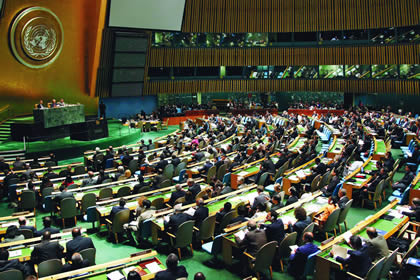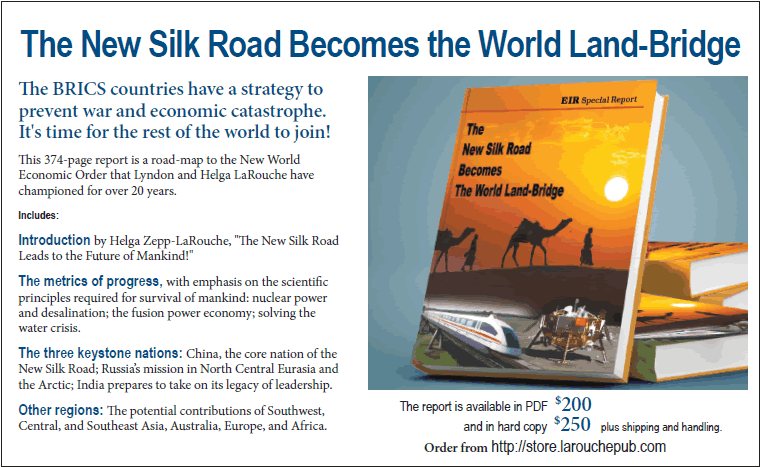Only a Fundamental Reversal
Of Economic Policy
Can
Solve the Refugee Crisis
by Helga Zepp-LaRouche
September 2015
This article appears in the September 25, 2015 issue of Executive Intelligence Review.

Helga Zepp-LaRouche. |
Sept. 22—In these stormy days in world politics there are two fundamentally different types of political and financial policy leaders: those guided by an optimistic image of man, who put forward a clear vision for the future of mankind, and those whose smallmindedness leaves no room for any image of man. Looking backward, they seek only to defend their power and evil deeds of the past—even though they are no longer defensible. In the dramatic changes of the coming weeks, we will only be able to solve the problems confronting us if we succeed in winning the European nations and the United States to the new paradigm represented by the economic policy of the BRICS states and the "win-win" perspective of China's New Silk Road.
There are signs of both tendencies in the refugee crisis, which is out of control in many EU countries, and exposes the lack of EU solidarity. After Chancellor Merkel, with her "We will do it!" had given a positive signal—in view of the unmanageable situation of so many refugees streaming into Greece, the Balkans, and Italy—Finance Minister Schäuble and Interior Minister de Maizière went straight into reverse. Schäuble, who is plagued by everything (except economic expertise), immediately repeated his mantra of a "zero deficit" in light of the initial costs of the admission of the refugees, and demanded cuts of an arbitrary sum of 500,000 Euros in other expenditures.
His approach showed the same underlying mentality of the taskmaster that we had seen in the brutal treatment of the Syriza government in Greece, and was probably intended to stir up the population, which had just shown generosity toward the refugees, against these same people, according to the motto: Either your daycare centers, or hostels for the refugees.
In contrast, however, and much more purposefully, several representatives of industry associations—from Ulrich Grillo of the Federation of German Industries to Ingo Kramer and Alexander Wilhelm of the Confederation of German Employer Associations—pointed to the great benefits of the immigration of workers for the German economy, in view of the 600,000 vacancies in the labor market. Wilhelm stressed that there are no signs that the refugees would take jobs away from anyone.
The positive aspect of the government's intention to spend two billion Euros for language classes to integrate the refugees is matched in the negative, as it were, by the 150-page draft law developed by de Maizière's Interior Ministry, designed for deterrence. It denies asylum seekers a decent minimum subsistence and replaces it with handouts of goods. For a large number of the asylum seekers, it will provide nothing a bag lunch and a rail ticket back to the country in which they first entered the EU. The authors of this catalog of measures obviously lack any understanding of the strategic situation, the human dimension, or the possibility of solving the crisis.
The EU presents a picture of great disunity, once again showing with unsurpassed clarity that there is no "European people," but merely a supranational oligarchical bureaucracy, which has hardly anything to offer, other than the inhuman Frontext border guard program for scaring away refugees, and rules which increasingly no one is following.
Glass-Steagall or Chaos
A change of scene. Last Thursday, the long-anticipated increase in interest rates by the Open Market Committee of the U.S. Federal Reserve Bank was once again postponed, and interest rates will therefore remain at almost zero percent, as they have been for almost seven years. Fed Chairman Janet Yellen's explanation for the postponement was riddled with lies. Yellen claimed her decision was based on "strong head winds from abroad"—a synonym for the latest turbulence on the Chinese stock market.
Several economists—from the chief economist of the Bremen State Bank, Folker Hellmeyer, to the governor of the Reserve Bank of India, Raghuram Rajan—immediately pointed out the inconsistency of this argument. While the Fed reduced its estimate of expected growth in the U.S. economy from 3% to 2.1%, the projection for China was only reduced from 7% to 6.9%; thus it was actually the weakness of the U.S. economy that motivated Yellen, not China's, whose real economy is showing steady growth.
While China is developing its western region with the strategy of the New Silk Road, relies on an economy driven by innovation, and invests worldwide in pioneering projects with many countries, the United States has a monetarist balance sheet, determined by the prices of such essential assets as stocks, real estate, bonds, and other investments. Put another way, while the illusion persists that the speculative values on Wall Street can continue to be honored—we are talking about several trillion dollars—when the crash comes, they will all be shown to be nothing but hot air, virtual money.
The real reason for the Fed's decision is being shouted from the rooftops by the Bank for International Settlements, the German daily Die Welt, and various analysts: Even a minimal interest rate increase of 0.25% would have brought down the entire house of cards of the Transatlantic financial system. And this unavoidable consequence has merely been postponed a little, since Wall Street and the European banking system are hopelessly bankrupt.
What is perfidious about the seemingly endless prolonging of this illness is that the de facto policy of zero interest rates—and soon negative rates—eats up savings and pensions, and drives the savings banks into ruin. When it comes to an uncontrolled collapse—possible at any moment—the result would be chaos, with unimaginable strategic consequences.
The BRICS Alternative
Fortunately, the alternatives are already at hand. At the upcoming United Nations General Assembly (UNGA) in New York, it will become clear that the offer of the Chinese to the United States and other important nations—to build the New Silk Road together with China and the BRICS nations in a "Win-Win" framework—is the most important political initiative at this time.

United Nations/Pulo Filgueiras
The Hall of the United Nations General Assembly, where the 2015 General debate will begin with speeches by heads of state on September 28. Both Russian President Putin and U.S. President Obama are scheduled to speak that day. |
In the days leading up to President Xi Jinping's visit to the United States, agreements have already been signed for China to build a high-speed rail line from Los Angeles to Las Vegas. Perhaps it's not the best choice of route, but at least it marks the beginning of cooperation between these two countries in the field of infrastructure. In the run-up to the UNGA the CEOs of the largest, most important corporations of China and the United States are going to meet. The Chinese wire service Xinhua explicitly repeated Xi Jinping's offer to the United States to work together in building the New Silk Road.
President Putin, in his speech at the UN, will invite the international community to join in a coalition against terrorism, which continental Europe has practically already joined by supporting Russian military operations against ISIS in Syria. Leading political figures in Germany, France, and Italy have underscored this strategic pivot in recent days, with expressions to the effect that neither the threat from ISIS, nor the Ukraine crisis, nor the refugee catastrophe can be resolved without Russia. Putin has set in motion a new dynamic—by sending Russian troops to Syria, proposing a private meeting with Obama in the course of the UNGA, and achieving an understanding between Foreign Minister Lavrov and Secretary of State Kerry on military cooperation between Russia and the United States in Syria.
All of these developments are leading in the right direction. Yet it is necessary to eliminate the fundamental causes that are ultimately responsible for both the threatened Transatlantic financial crash and the refugee crisis. These causes lie in the attempt to maintain a "unipolar world"—a diplomatic circumlocution for world empire—subordinated to the rules of a few banks and corporations, and based on maximizing profits for a small financial oligarchy through speculation—at the expense of the common good. The governments of states that refuse to submit to this world empire are swept away through wars based on lies—hence the refugee crisis.
The best hope is to put an end to the casino economy of Wall Street and the City of London through a return to the Glass-Steagall bank separation law in the United States, and then perforce in Europe. In the U.S. House and Senate, identical Glass-Steagall bills have already been introduced that are garnering more and more support. The re-introduction of Glass-Steagall under these conditions is the hottest issue in the U.S. presidential campaign; it is the sole hope for preventing a chaotic collapse in the coming weeks by getting rid of the toxic waste of the banks pre-emptively.
Should this be done, all doors will be open for the United States and the European nations, together with the BRICS states, to put the policy of the New Silk Road for the economic development of Southeast Asia and Africa on the agenda.
Whether the human race—faced with potential extinction in a thermonuclear war, through a self-imposed descent into chaos and through cultural decadence—has the moral fitness to free itself from this old paradigm and to consciously initiate a new era of human history, will be decided in the next weeks and beyond, in Manhattan.
Be active participants in this decision—not casual onlookers!
 Buy the book |
